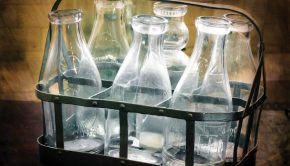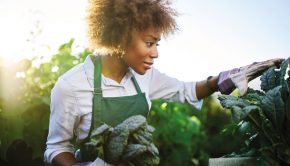Ever-More-Green in 2014 ~ Easy Ways to Go Eco Right Now
New Year resolutions can be a distant memory by mid-January, due to unrealistic expectations, slow results and distractions that sideline good intentions. Yet we may still reap the rewards of a greener, healthier lifestyle by progressively adopting small, doable changes.
Nifty Switches
Switch to public transportation or telecommuting at least twice a week to reduce greenhouse gas emissions.
January white sales present a prime opportunity to change to organic cotton sheets and dry-fast towels to reduce energy usage. Local animal shelters welcome old towels and blankets. Homeless shelters also accept gently used clean linens and outgrown cold-weather gear.
Replace family toothbrushes with eco-friendly models made from renewable castor oil plants instead of petroleum. The Naturally Clean Toothbrush is BPA-free and recyclable (TomsOfMaine.com).
Each day, Americans use 500 million disposable straws, reports Milo Cress, founder of the Be Straw Free Campaign (Ecocycle.org). Discarded plastic straws and stirrers are on the Ocean Conservancy’s top 10 list of debris littering beaches. Cindy Schiff Slansky, CEO of GreenPaxx, in New York City, suggests using a reusable silicone straw. “The bright colors help keep track of each person’s drink. They’re in my purse for when I eat out with my kids,” she says. “We always say no to disposable straws.” Also consider paper straws that compost within 45 to 60 days.
Plug electronics into power-saving energy strips that can be turned off when machines aren’t in use. Completely shutting down computers saves more energy than using sleep mode.
When it’s time for a more energy-efficient fridge or freezer, call the electric company. The Appliance Recycling Centers of America work with utilities to pick up and recycle working appliances. Air conditioners and dehumidifiers are accepted with a qualifying fridge or freezer. Alternatively, call a local recycling company for a curb pickup of broken appliances; even easier, confirm that the company delivering a new appliance will take away and recycle the old one.
Upgrade to a greener model when the need arises to change cars. California, Connecticut, Maryland, Massachusetts, New York, Oregon, Rhode Island and Vermont have pledged to speed the construction of charging stations in their states and project collectively having 3.3 million battery-powered cars, plug-in hybrids and other clean-burning vehicles on their roads by 2025.
To make clean and renewable home energy affordable and increase property values, Sunrun installs and maintains home solar power panels in 1,000 cities in 11 states for low and predictable monthly rates (Sunrun.com).
Choose green products carrying the 1% for the Planet logo. Identify participating companies at Tinyurl.com/
OnePercentPlanet.
Table Tips
One-pot, slow-cooked hearty stews and soups—especially made with seasonal, locally grown vegetables—use less energy and need less water to wash. A slow cooker can also steam rice, make yogurt or bake simple, whole-grain breads (VitaClayChef.com).
Dave Feller, CEO of Yummly.com , in Redwood City, California, adds, “Slow cooking tenderizes meats and brings out flavor, even in less expensive cuts. It’s also a timesaver.” Yummly recipes detail ingredients, cooking times and nutritional values.
For family snacks, Terry Walters, the Avon, Connecticut, author of Clean Food and Clean Start, advocates going untraditional. “Get closer to the green plant than the processing plant,” she advises. At least once a week, she likes to try a new food. “Roasted chick peas, kale chips or a ‘pizza’ made from a rice tortilla, pasta sauce or pesto, and veggies all make ‘clean-food’ snacks.” (Recipes at TerryWalters.net.)
Keeping produce fresh can be a challenge, especially when the average fridge can harbor millions of bacteria, according to testing by Microban Europe, UK. The BerryBreeze in-fridge automated device periodically circulates activated oxygen to prevent mold, keeping produce fresh longer and reducing spoiling to save grocery dollars(BerryBreeze.com).
Hannah Helsabeck, president of eco-friendly WildMintShop.com, shares can-free meal tips online. “It takes a little planning, but we can now avoid all the toxic chemicals used in processing foods and making cans. Let’s kick the can!”
Also, check out local food Meetup groups. Penny Miller, of Wichita Falls, Texas, says, “At our first meeting, we saw examples of raised-bed gardens, rainwater harvesting, composting, native landscaping and container plants.”
Avery Mack is a freelance writer in St. Louis, MO. Connect via AveryMack@mindspring.com.
<












